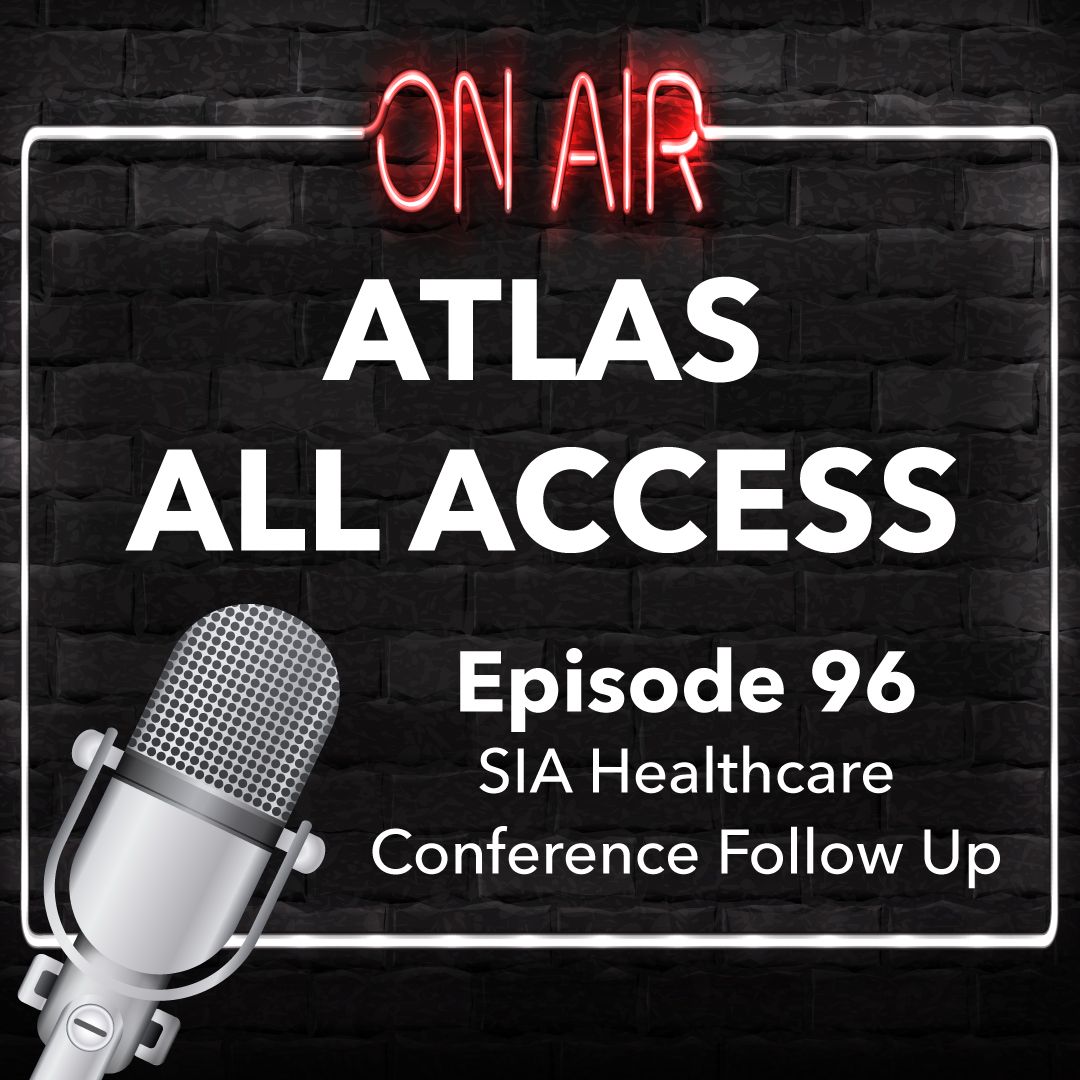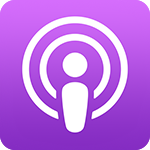
Your questions answered from the SIA Healthcare Conference - Atlas All Access 96
12-06-2019
How do the changes in the Healthcare Staffing industry impact you as a traveler? What changes do you need to watch for and stay on top of?
We answer your questions about the SIA Healthcare Staffing Summit, and what those changes mean for the active traveler and for the person considering traveling for the first time.
Check out the podcast episode on the SIA Healthcare conference that sparked these listener questions: https://tinyurl.com/sjceowl
Rich Smith: On this episode, we revisit the SIA Healthcare Staffing Conference from just two months ago and answer some of your questions Atlas All Access starts now. Adam Colette, welcome back.
Adam Colette: How are you today?
Rich Smith: Okay, so I wanted you in here because we had some questions after the last this was probably two, three episodes back. We talked about Steve and I both spoke at the SIA staffing industry analysts healthcare only conference in Las Vegas and each one of us had a different panel. His was more about growing a company and mine was more like trends in the industry or whatever. And we had some questions after that online specifically it's like how does this relate to travel nurses? How does this relate to traveling healthcare professionals? And I get it I mean sometimes we get so involved in the business side or whatever. How does this relate down to the person working in the hospital in the end.
Rich Smith: So three questions on this. First one, and this is thanks to viewers by the way. You guys asked these questions. I appreciate that and I know we're going to get some good answers out of these. So SIA, a few weeks ago talked about trends in the industry. One of the biggest was evolving the role of the recruiter, which we've talked about a lot, not how the recruiter is going away but how the role is changing. How have we seen it change so far and how much do you think it will continue to evolve?
Adam Colette: One thing that comes right to the front of the mind is I think the traveler in the past has come to the recruiter for a lot of knowledge and questions and I think there is so much, because of the internet, because of Facebook, because of other platforms, there is so much more information out there that more and more travelers that I'm talking to have a better idea of what the travel nursing world is about. So it's not more, I have less conversations of explaining what traveling is and how traveling works to more of just more jobs and, "Okay, I'm ready to do this. Let's get my ducks in a row and go that."
Adam Colette: So, I think it's less, at least in my job what I've seen over the years is less of a teaching role and more of a actual placing role, putting profiles together and placing them. So, I think technology and just the knowledge that is out there and I think that can go with consumers buying products, I think that can go with a lot of things is that there's just more knowledge, there's more out there to go and get knowledge before you make a purchase or before you make a career change.
Rich Smith: Absolutely. So you've done this five ish years now is that right?
Adam Colette: Yup.
Rich Smith: So you've skipped ahead a few steps maybe necessarily then.
Adam Colette: Sure.
Rich Smith: So, instead of just like, "Hey first phone call tell me about this travel nursing thing," it's more, "I've got the information that I need I believe let's start talking about per diems, and housing, and now let's start talking about I want to go to Colorado but why is the pay so low," or whatever those types of conversations that come up now. So, that actually leads into question two. Question two was another trend was the increase in technology but not the reliance on technology. In this world how can a nurse looking for a contract use what's available without losing touch with what the agency provides?
Adam Colette: Sure.
Rich Smith: I'll give you my take on this. It's the evolution and I hate when people make this, the connection between shopping or whatever because your professional license isn't the same as where I buy groceries, that type of thing or whatever. However, I've gotten way more savvy about purchases because of this little tool right here and I don't rely on it strictly for that. I still go to Walmart probably more than I like to admit. But then I'll do my share of purchases on Amazon or whatever. So I rely on this but I haven't lost touch with the walking into a store and still buying that. So I think in the end the traveling healthcare professional is still buying something. I'm just, I'm using that as a very loose term. You're still buying into whatever the agency provides, or to the philosophy of the agency or whatever. So in your view how has technology changed that?
Adam Colette: Yeah, I think the big thing on that is I think we're leaning towards companies that aren't having recruiters and aren't having some of those things.
Rich Smith: That's exactly it.
Adam Colette: And I go back to, and I had a conversation with a really good ER nurse out in California this last week and he's like, "Hey, I started a contract." This guy's making so much more money than I am and he's like, "Adam, I don't care." He's like, "I don't care. I want to have the stability of being able to call you when something goes wrong, or when I need that next contract, or I just need somebody to talk to I know you're going to be there." He's like, "I never want to do this alone." And I told him, I said, "That's weird because a lot of people that I work with you would be somebody that I'd be like, 'He'd totally be fine on his own. He can handle this stuff. He gets his compliance done right away. He doesn't have a ton of questions. He's a great nurse, never has issues on assignments."
Adam Colette: But in the same sense it's exactly what he said he's like, "I need that friendship. I need that person behind the phone that I can talk to and I can talk things through." And he's like, "That's never going to go away." And so the technology is great but I think you still need somebody. We all look on our phones and we, like you said you shop Amazon, you shop Walmart, you shop those different places, but you also go to work and you find that person, "Hey, who's bought a refrigerator recently? What's wrong with it?" You still need that person, that social interaction of maybe some encouragement that you're making a good purchase or a good choice moving forward on something.
Rich Smith: Without a doubt. And I almost think that the inverse has maybe happened of some of these companies that without the recruiter have wanted. They still exist, they're still placing nurses, they're still raising money, they're still raising capital or whatever to get off the ground. However, because of that, because that's all come to light it's put the relationship, like you talked about, it's shined a light on it more. I mean it really has and it's made people that you think that could do this like you said want that relationship with you, want that recruiter that's in their corner more. So it's almost had the reverse effect which is super interesting how that's played out. So, all right= the last question, the final trend was the increased usage in MSPs. So from a recruiter/traveling healthcare professional standpoint is this good, bad is this just the way the industry is going to be?
Adam Colette: Yeah. MSPs, and we've talked about this once or twice before as well, an MSP or a vendor of some sort basically what they're doing is going into a hospital system and saying, "We are going to provide nurses for you." And so agencies like us can't have direct contact with a hospital, or a facility, or managers where back in the day you as a client manager could call an ER manager in ABC hospital and say, "Hey, I have a candidate," or, "Do you need candidates?" Basically what the MSP has done is blocked that of some sort but it's also a point of it used to be 12 agencies around the country doing this where now you have 600, 800 mom pop shops, big people, the big players, us in the middle of somewhere that everybody would be calling an HR person and they would run them out. So this eliminates that for the hospital to do their day to day business and they have one single point of contact being the MSP.
Adam Colette: I think it's a personal choice if you think that's a good thing or a bad thing. I don't think it's a bad thing. The thing that gets crazy and is what's going to happen over time is we on our side start hearing about these tiering systems. So you're going to have to find a company that is tiered, a tier one or tier two, that is getting same day needs as when the needs go live. Whereas there's some places that you could get needs two, three weeks down the line that after they've already been posted and they can't fill them and so you can't get your access on them. So I think that's where it gets frustrating on the agency side is if you can't get into those tier one, those tier two needs on some stuff you can't place people at certain hospitals, you just never will unless you work through it and you go through it.
Adam Colette: I think that's something that we've done at Atlas really well is partnered ourselves with those big MSPs and we like them all, and we play nice with them all and we try to be good partners on there. And I can't think of a big one that we don't play nice with. So, we're super lucky and fortunate to get most of those jobs. But I think it's important that you find an agency that is going to be open with you of, "Hey, do you have contracts in these locations," and not.
Adam Colette: And as a recruiter on that, I have no problem telling people, "Hey, I can't get you to A, B, C location. If you want to do that go with somebody else. Come back to me when you can." But at the end of the day I think they are good things as long as ... I hate using the monopoly. There are some out there that are starting to monopolize different areas and different places and I don't like that. I like free range of business and everybody having a fair chance. And I just don't want to see our industry go to that, that one, two, three major players have every single contract in the country and they're going to control who has access and who doesn't.
Rich Smith: I don't know if it'll ever get maybe to that level. I think there will always be some different levels there. We've seen major systems move from one MSP, to a VMS, then back to an MSP. There's been some shifting in the industry before so I don't think that necessarily would change. I think the one thing that you said that I wrote down ahead of time and then you said it was access. It's just access that the more of these that pop up the more they keep working, the more of them that grow that we have access to, they have access to in the end.
Adam Colette: Yep. And I think something important to say in December of 2019 and going back to I have done this five years is I've seen where it's been really, really good MSP ways. I think over the last two, three years we saw MSPs really battle it out and battling it out is they'd go into a hospital and say, "Hey, we have more candidates and we can do this for less." The next MSP comes in and says, "Hey we have more candidates and we can do this less." And it's really driven down the rates not huge but significantly enough that nurses could tell a difference. I feel that there are less travel nurses out there and more open jobs and we're really starting to see the rates rise and that's a positive thing in my book.
Rich Smith: I think so too. And I think the way that the MSP has been sold over the past couple of years to hospitals, I use sold in a very loose way, but the way that each of these larger MSPs have sold their product to a hospital isn't necessarily always been on rates. Recently it's been on volume, it's been on filling those needs, and part of that is that tiering system. Look we have, if you look at the top 25 in our tier one they're all top 25 in fact they're all top 15 or whatever. So we can fill these, we, not we, pretend vendor, pretend MSP says, "We can fill these needs better than anybody else that's pitching you right now." And I'm seeing that more than just the rates are lower that's all. Which I think is a very, it's a good thing for us, it's a good thing for the agencies, it's a good thing for the travelers in the end. So all right, well thank you for coming to answer some questions with us today.
Adam Colette: No problem.
Rich Smith: So, keep sending those questions. I love it when we get interaction like that it's great. The more we can do here in that and answering your questions the more information that you'll have. So then you skip farther ahead in the process when you get to this guy right here.
Adam Colette: Yep knowledge is power in this industry. I said it before there's no dumb questions and the more knowledge that you can have the better traveler you're going to be.
Rich Smith: All right. We'll see you next week.
Adam Colette: Thanks guys.



